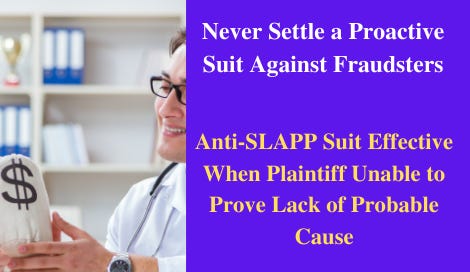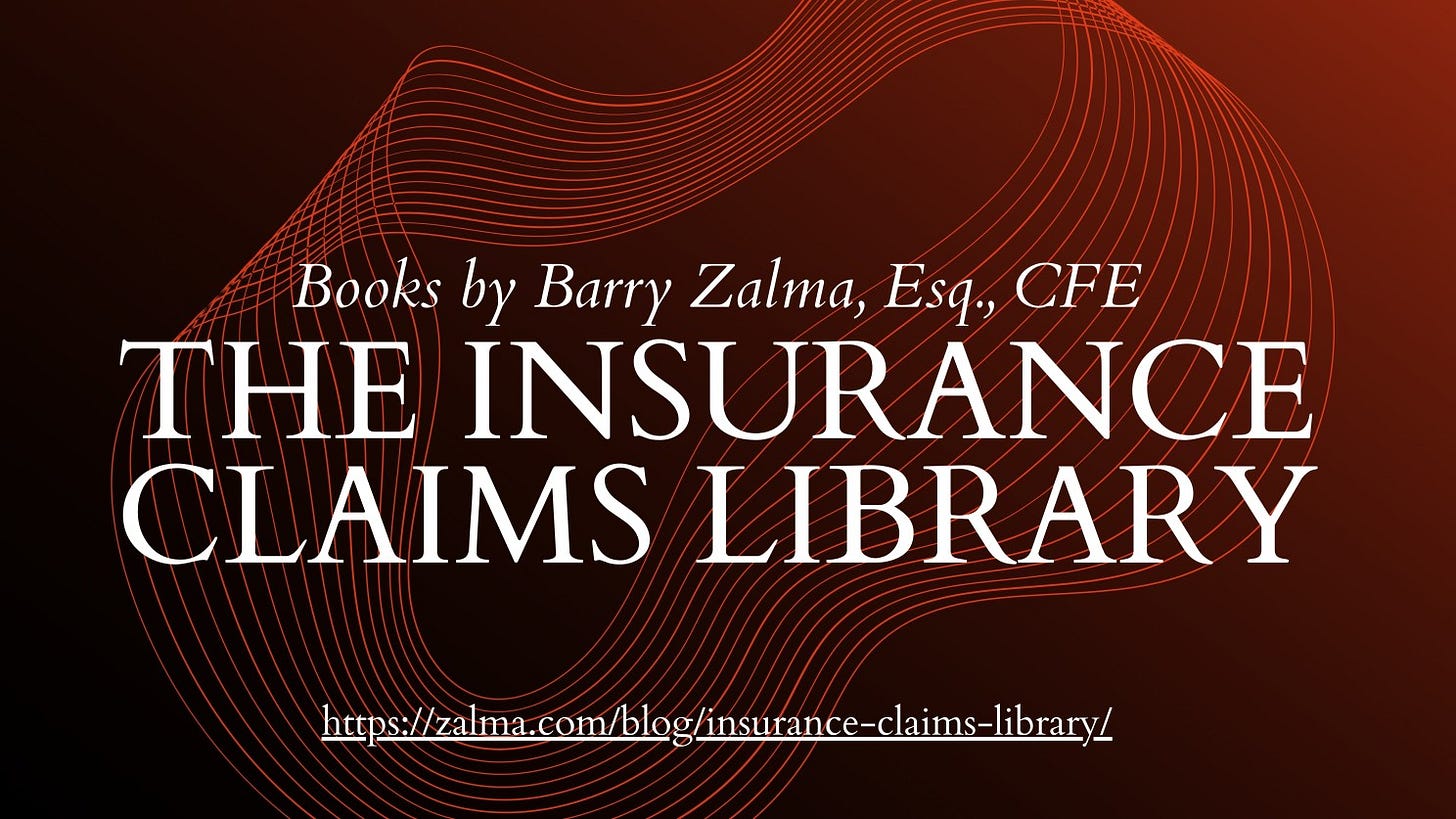Never Settle a Proactive Suit Against Fraudsters
Anti-SLAPP Suit Effective When Plaintiff Unable to Prove Lack of Probable Cause
Read the full article at https://lnkd.in/gwiZjyjm and at https://zalma.com/blog.
Posted on May 13, 2022 by Barry Zalma
When nine insurers sued a doctor for conducting a scheme to defraud them they folded after a partial summary judgment was granted by a US District Court leaving other charges of fraud available. The insurer plaintiffs then settled with Dr. Ajay Mahabeer only to be sued for maliciously prosecuting the suit against him. In Ajay Mohabeer v. Farmers Insurance Exchange, et al, A172057, 318 Or.App. 313, Court of Appeals of Oregon (March 16, 2022) the Oregon Court of Appeals ruled on the insurers’ Anti-SLAPP Motion.
BACKGROUND
Plaintiff brought this action against nine insurance company defendants (collectively Farmers) and Farmers’ attorneys, Cole, Wathen, Leid & Hall, P.C., and Ryan J. Hall, for wrongful use of civil proceedings, alleging that defendants filed insurance fraud claims against plaintiff in federal court, which were ultimately settled, but which were brought with malicious intent and without probable cause. The Defendants filed a special motion to strike the claims under ORS 31.150, Oregon’s Anti-Strategic Lawsuits Against Public Participation (anti-SLAPP) statute, contending that plaintiffs claims seek damages for conduct that is protected under ORS 31.150(2), and that plaintiff could not present substantial evidence that he would prevail on his claim.
Defendants appealed.
THE SLAPP MOTION
The special motion to strike, ORS 31.150(1) provides:
A defendant may make a special motion to strike against a claim in a civil action described in subsection (2) of this section. The court shall grant the motion unless the plaintiff establishes in the manner provided by subsection (3) of this section that there is a probability that the plaintiff will prevail on the claim. The special motion to strike shall be treated as a motion to dismiss under ORCP 21 A but shall not be subject to ORCP 21 F. Upon granting the special motion to strike, the court shall enter a judgment of dismissal without prejudice. If the court denies a special motion to strike, the court shall enter a limited judgment denying the motion.
A defendant making a special motion to strike has the initial burden to make a prima facie showing that the plaintiffs claim is of the type described in Oregon statutes. If the defendant meets that burden, the burden shifts to the plaintiff in the action to establish that there is a probability that the plaintiff will prevail on the claim by presenting substantial evidence to support a prima facie case.
Plaintiff is a licensed medical doctor who practiced medicine in association with First Choice Chiropractic clinics. In 2013, defendants filed several claims in federal court naming as defendants First Choice Chiropractic clinics, plaintiff, and several other individuals, based on allegations that the clinics and individual defendants had committed insurance fraud by making false reports of alleged symptoms and exaggerated findings designed to make it appear that the patient either had or continued to have injuries/ symptoms which did not actually exist.
Farmers and plaintiff subsequently settled Farmers’ remaining claims against plaintiff in the underlying action and stipulated that plaintiff would be considered the prevailing party.
On appeal, it is undisputed that plaintiffs claim falls within ORS 31.150(2Xb). The allegations of plaintiffs claim are based solely on written statements and documents provided to the federal court in the context of the underlying action. The only dispute on appeal concerns whether plaintiff has met his burden to present prima facie evidence as to each element of his claim of wrongful use of civil proceedings.
DISCUSSION
One element of the claim of wrongful use of civil proceedings is an absence of probable cause to prosecute the underlying action. “Probable cause” means that the person initiating the underlying action “reasonably believes” that there is a good chance of prevailing, viz., the person “has that subjective belief and that belief is objectively reasonable.” Defendants assert that plaintiff has not sustained his burden to present prima facie evidence that Farmers lacked probable cause to bring the underlying action.
Oregon’s anti-SLAPP statute provides “an expedited procedure for dismissal of certain nonmeritorious civil cases without prejudice at the pleading stage.” [Neumann v. Liles, 358 Or. 706, 723, 369 P.3d 1117 (2016).]
When facts are in dispute, proof of the absence of probable cause in establishing a claim for wrongful use of civil proceeding is a mixed question of law and fact. In the context of the special motion to strike, however, the existence of prima facie proof of the elements of the claim being challenged by the motion is something that the court determines as a matter of law, based on the pleadings and supporting and opposing affidavits stating the facts upon which the liability or defense is based. It is, therefore, not premature for the court to decide whether prima facie evidence of the elements of the claim has been presented before full discovery or for a party to raise the issue on appeal of the denial of a special motion to strike.
Defendants contended that the summary judgment ruling of the federal district court in the underlying action either conclusively establishes that Farmers had probable cause to bring the underlying action or gives rise to a rebuttable presumption of probable cause.
The federal district court concluded that Farmers had demonstrated genuine issues of material fact as to whether plaintiff (1) made material misrepresentations, either knowingly or recklessly, by signing off on falsified chart notes; (2) engaged in a pattern of racketeering by committing indictable acts through wire and mail fraud; (3) engaged in a conspiracy to commit racketeering; and (4) was unjustly enriched by fraudulent claims made to Farmers by falsified chart notes.
The Court of Appeal adopted a categorical rule that the denial of a motion for summary judgment in the underlying litigation conclusively established or created a rebuttable presumption of probable cause. Independent of the federal district court’s summary judgment ruling in the underlying action, there was ample evidence in the record that defendants had probable cause to name plaintiff as a defendant in the underlying action, including affidavits of former clinic employees, who described plaintiffs participation in a scheme to over-treat patients and overbill insurance.
Plaintiff disputed that evidence but has not rebutted it with evidence to support his position.
The Court of Appeal concluded, therefore, that plaintiff did not met his burden to present prima facie evidence of a lack of probable cause, and that the trial court erred as a matter of law in denying defendants’ special motion to strike.
ZALMA OPINION
Insurance companies that proactively file suit against people they believe have perpetrated fraud against them should be commended. However, the insurers bringing such actions – whether direct or under qui tam statutes – must have the courage of their convictions since insurance fraudsters have no morals. In this case, after entering into a settlement with the doctor they faced a suit from the doctor which could have been avoided if they insisted on taking the federal fraud case to trial. Since the USDC refused to grant the doctors summary judgment motion there was obviously probable cause to bring the action.
(c) 2022 Barry Zalma & ClaimSchool, Inc.
Barry Zalma, Esq., CFE, now limits his practice to service as an insurance consultant specializing in insurance coverage, insurance claims handling, insurance bad faith and insurance fraud almost equally for insurers and policyholders. He practiced law in California for more than 44 years as an insurance coverage and claims handling lawyer and more than 54 years in the insurance business. He is available at http://www.zalma.com and zalma@zalma.com.
Subscribe to Zalma on Insurance at locals.com https://zalmaoninsurance.local.com/subscribe.
Subscribe to Excellence in Claims Handling at https://barryzalma.substack.com/welcome.
Write to Mr. Zalma at zalma@zalma.com; http://www.zalma.com; http://zalma.com/blog; daily articles are published at https://zalma.substack.com.
Go to the podcast Zalma On Insurance at https://anchor.fm/barry-zalma; Follow Mr. Zalma on Twitter at https://twitter.com/bzalma; Go to Barry Zalma videos at Rumble.com at https://rumble.com/c/c-262921; Go to Barry Zalma on YouTube- https://www.youtube.com/channel/UCysiZklEtxZsSF9DfC0Expg; Go to the Insurance Claims Library – https://zalma.com/blog/insurance-claims-library/







